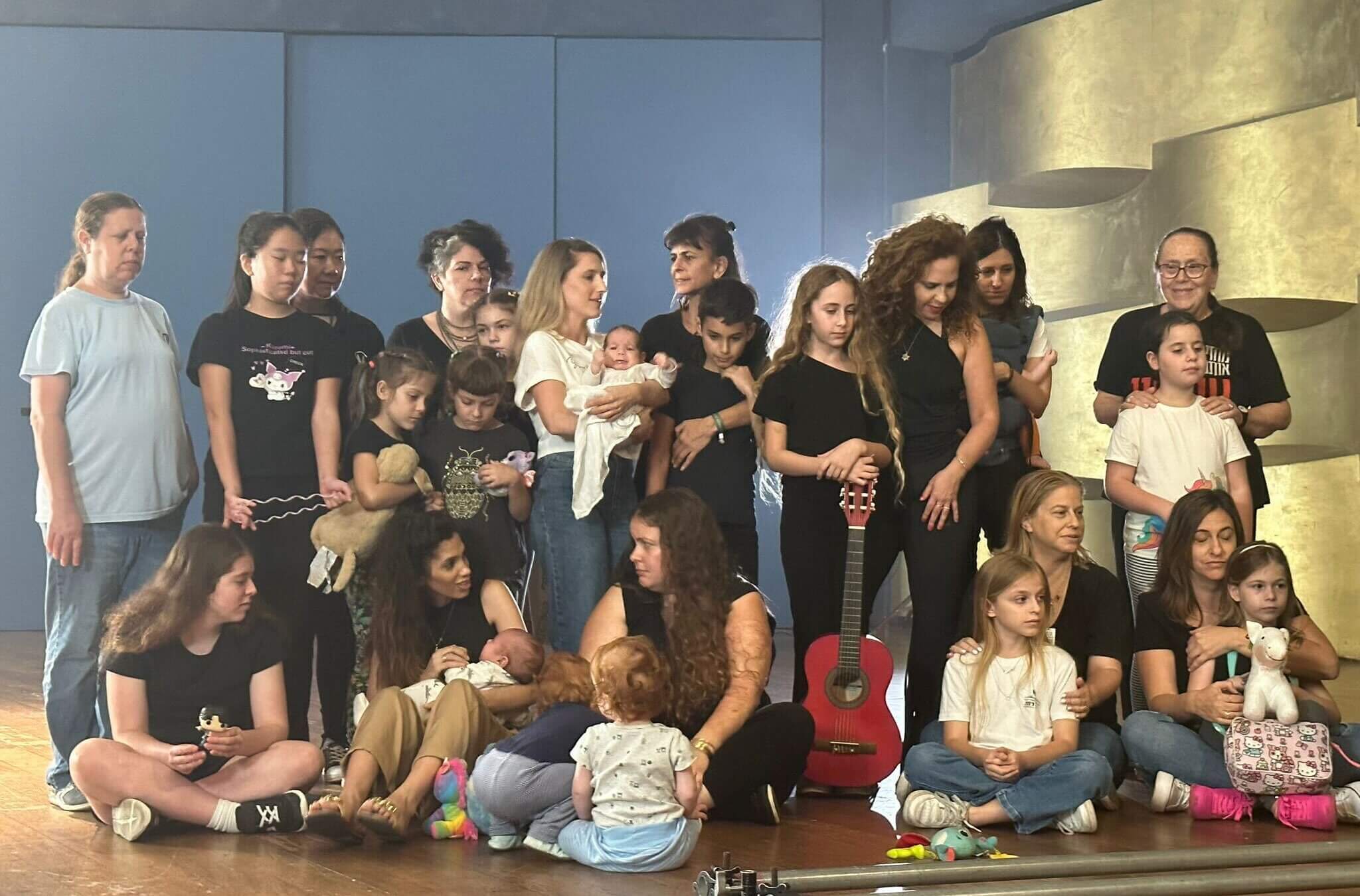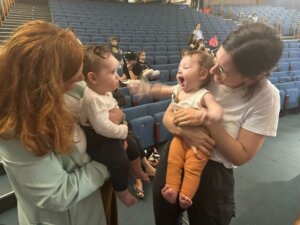Israeli peace activist and ex-politician is now a songwriter with a message: ‘Children need to be home’
Stav Shaffir invited Israel’s worried mothers to help with a music video about the hostages. The next day, 120 women showed up

Mothers and children at the Tel Aviv Museum for the filming of Children Need to Be Home. Courtesy of Stav Shaffir
On one of the many sleepless nights that Stav Shaffir has had since Oct. 7, a song popped into her head.
“Bring them home,” the words repeated over and over. “Bring them home. Children need to be home.”
“Just like every other mother in the country now, I can’t sleep,” Shaffir, a former member of Israel’s Knesset, said in a phone call from Israel. “On one of those nights, holding my own baby, this song came out like a prayer. I kept singing it in my head. I thought, ‘Let’s do something with it.’”
So she sat down at her piano, picked out the melody, wrote a full set of lyrics and music, and decided to record it. A few nights later, she put out a call for mothers to join her to film a video for the song. She posted the invitation at 11 p.m. in her WhatsApp groups and asked folks to help spread the word.
The next morning, more than 120 mothers and their children showed up — Jewish women, Arab women, Asian women, secular and religious, a mother who drove four hours with a carful of kids and another mother with a 10-day-old newborn.
‘The look in every mother’s eyes’
The result, filmed at the Tel Aviv Museum, is a tender, emotional video for the song, called, “Children Need to Be Home.” Now on YouTube, it shows mothers and children doing perfectly ordinary things — hugging, playing pattycake, tossing balls and balloons — while Shaffir delivers her heart-rending lyrics in a clear, sweet voice:
It’s been nights and days that I cannot sleep
Since that Saturday, my heart was taken with you.
From our little home with its garden green
With your sleepy doll in your tiny hands
Now you are in hands that aren’t mine.
Each verse ends with a simple but powerful refrain: “Bring them home, bring them home, children need to be home.”

Shaffir, a lifelong peace activist who served in the Knesset for eight years as a member of the Labor Party, now heads Israel’s Green Party. She plays piano, guitar and oud, but never published her songs or performed professionally until now.
Her own baby, Iyar, is about the same age as Kfir Bibas, the youngest of the 240 hostages taken by Hamas in the Oct. 7 attacks.
“I kiss my baby and I think about the baby who was taken hostage with his parents and his brother on that horrible morning, the 7th of October,” she said. “What we tried to capture in the video was the look in every mother’s eyes, where we try to act like things are normal, we try to smile, we try to keep ourselves busy and not show our children what we actually feel. But every mother’s look, in the last few weeks, is the same — it’s the terrified, shocked, worried eyes that all of us have right now.”
She wrote the song in English to spread her message internationally, keep attention on the hostages’ plight and counter the hatred and denials that have sprung up around the world since Hamas murdered 1,200 people and took the survivors of their rampages — including 30 children — hostage.
“We’re very much aware of the global discussion of the war in Gaza, and the misconception of things that happened here, who the Hamas terrorists really are,” she said. “People deny what happened to Israelis, they deny the massacres that Hamas did in Israeli villages and kibbutzim. Many times when I raise the issue of the children being held hostage, I get a response from people, ‘This doesn’t really happen.’” She added that hearing about posters of kidnap victims torn down in the U.S. “brings tears to my eyes.”
The video is an attempt to make “mothers and fathers around the world understand what we’re going through. Children should not be a weapon in any war. Children should be home.”
‘The best people in this country’

Watching the video, you can’t tell the ethnic background of many of the mothers, and that’s by design. “For me it was really important to not say who is what, because we’re all together. We’re all just mothers,” Shaffir said.
Shaffir also reads everything she can about what’s happening in Gaza, where officials say Israel’s bombings and raids have killed more than 11,000 people, many of them children. “It’s important to me to know what people on the other side are going through,” she said. “Of course I am thinking about them all the time too. I am a mother. I think about their mothers, I think about their babies. I hate to see that children and people in general suffer so much because of the violence and the extremists.”
She said she knew many of the victims of the Hamas attacks — including Vivian Silver — from her work in the peace movement and the Knesset. “Many of these people were activists for democracy and peace,” she said. “They lived on the Gaza border, they suffered from rockets coming from Gaza for 20 years. But they believed in a two-state solution, that peace is possible, and with all that suffering and fear, they never stopped believing. Some of them were killed that day, some survived or were partners and friends of people who were killed. They are the best people in this country.”
Shaffir said that she also still hopes for “peace and a two-state solution,” and her final verse reflects that:
And I’m asking you, will this ever change
If we won’t rise up, make our voices heard
For every child out there who deserves to be free.
And I know there is evil in this world
But I always thought that even in the dark
There is hope. There is hope.
Bring them home.
The song can also be heard on Spotify.
A message from our Publisher & CEO Rachel Fishman Feddersen

I hope you appreciated this article. Before you go, I’d like to ask you to please support the Forward’s award-winning, nonprofit journalism so that we can be prepared for whatever news 2025 brings.
At a time when other newsrooms are closing or cutting back, the Forward has removed its paywall and invested additional resources to report on the ground from Israel and around the U.S. on the impact of the war, rising antisemitism and polarized discourse.
Readers like you make it all possible. Support our work by becoming a Forward Member and connect with our journalism and your community.
— Rachel Fishman Feddersen, Publisher and CEO

























